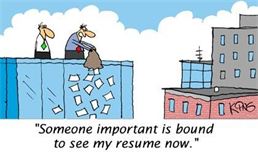Click on this link to view video of an interview with the technology recruiters at Google. They discuss what they look for in a candidate, the ideal resume length and more!
Have you had, or been asked, to participate in a virtual interview? How did it go? Would you like tips for this type of interview? Research shows that nearly half of screening interviews for jobs are NOT conducted face-to-face. One of the best things you can do as a job seeker is to prepare yourself for virtual interviews, including phone screenings and Skype and other video interviews.
The Virtual Readiness Workshop is geared towards transitioners (career or job changers). Join Katrina Brittingham, Readiness Consultant, on Tuesday, August 26th at 10:00 a.m. and 6:00 p.m., where she will specifically target the needs of each attendee and coach you on where you are going. Space is limited, so register today to receive the early bird rate. Register at http://ventureready-virworkshop1.eventbright.com
Computer Programming – Understanding computer programming is, understandably, a prerequisite of the job, and will be the first step in starting your future as a software engineer. The requirements for computer programming can vary by title, and a job might require specific knowledge in one area such as software, applications, web, and more.
Logical and Structured Thinking – Dealing with software requires very structured thinking, since problems can arise from the smallest of errors. It can also require patience and thinking outside the box in order to solve problems with software.
Attention to Detail – Software engineers need to locate and identify even the smallest glitch in seemingly endless lines of coding in order to fix an issue. This requires an extreme attention to detail, since surfing through code to find something as simple as one number that might be off can be arduous. On the flip side, this good attention to detail extends to actually writing the code as well, since one wrong character can mess up the finished product.
Core Programming Language – It will be important to become familiar with programming languages and different operating systems, but software engineers need to be fluent in at least one. These languages can evolve and change over time, so be sure to keep up on the latest in the field. Currently, some of the popular programming languages include C++, C#, Java, Lisp, Python, and more.
Research shows that nearly half of screening interviews for jobs are NOT conducted face-to-face. One of the best things you can do as a job seeker is to prepare yourself for virtual interviews, including phone screenings and Skype and other video interviews.
On Tuesday, August 26, 2014 at 10:00 a.m. and 6:00 p.m., Katrina Brittingham, Owner & Readiness Consultant of VentureReady LLC will discuss phone and video interview techniques that will make you more attractive to employers, which may help you get the job.
This workshop is geared towards transitioners (career or job changers). For registration information, go to www.ventureready-virworkshop1.eventbrite.com.
I had a client ask me, “What is the difference between keywords and core competencies”?
There is indeed a difference between keywords and core competencies. Keywords are nouns, phrases, and acronyms, including degrees, job responsibilities, computer applications, job titles, training, licensure, education, professional organizations, company names, awards, key industry terms, and geographic locations. Competencies are specific skills relevant to the job — defined as “a written description of measurable work habits and personal skills used to achieve a work objective.”
Both core competencies and keywords are required in a resume. Core competencies are at the top of the resume to highlight skills. Keywords are dispersed through your resume so that Applicatant Tracking Systems (ATS) can match you resume to what employers are looking for.
To have a professionally written resume that is keyword rich and has strong core competencies, contact VentureReady LLC at info@ventureready.net.
SERVICES INCLUDE:
- Start-up Strong —Business Coaching
- Flex Coaching
- Business Growth Coaching
- Business Building Concierge
- The ExecutiveGPS
Conference
VentureReady
Speak to a Career coach today: Schedule online
(888) 712 4956
info@ventureready.net
Brand Mission
Our mission is to never see another entrepreneur fail. Entrepreneurship is the beautiful, challenging journey of bringing your true self into the world in a way that serves others while also serving your life goals.



